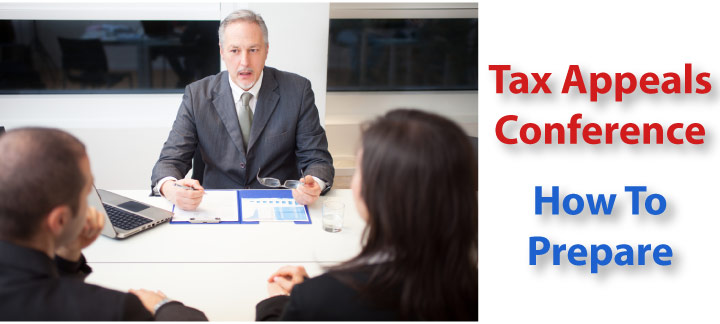The Tax Appeals Conference - How To Prepare
The Tax appeals Conference is generally an informal affair. However, despite the informality, it is worth noting that the judge presiding over the tax appeals conference is technically an adversary to the taxpayer who argues the IRS’s position. In addition, the tax appeals officer himself potentially has a slight psychological advantage over the taxpayer in that the appeals officer does not have to concern himself with satisfying a client, the cost of continued tax litigation, and other factors that might mitigate in favor of settling the matter. That being said, the taxpayer and his or her representative can take steps to prepare for the conference in order to obtain the best outcome possible.
Information Gathering Can Help to Prepare for the appeals Conference
One of the most important steps a taxpayer and his or her representative can take is to gather information before the appeals conference takes place. Preparedness and superior knowledge are key components of a successful negotiation with the appeals Officer. The first and easiest way to gather information is to thoroughly review the taxpayer’s file on the issues, as well as thoroughly interview the client on the matter. Typically, the only witnesses involved in the appeals conference are the taxpayer and the taxpayer’s representative, so knowing all the facts and details from the taxpayer’s account and client file can provide an advantage over the appeals officer. The taxpayer can bring witnesses to the appeals conference, but this will require collecting affidavits for witness statements. Another way to gather information before the appeals conference is by requesting the administrative file from the appeals office. Sometimes, the appeals office is hesitant to turn over this information, in which case the taxpayer is free to file a Freedom of Information Act (FOIA) request.
Understanding Who Prepares the Case for the appeals Conference
As a general rule, appeals officers do not prepare their own cases for the appeals conference. This is an inherence weakness in how the appeals office prepares for its cases, which can possibly balance out some of the other advantages appeals officers have over taxpayers in the appeals conference process. Most of the information that the appeals officers use to prepare for their case comes from the local IRS office that originates the assessment against the taxpayer. In addition, appeals officers are not supposed to have ex parte discussions with those originating officers about the taxpayer’s case. It can be very difficult for appeals officers to obtain additional facts about the taxpayer, other than from the taxpayer itself.
The information that the appeals officer receives can also vary depending on the identity of the originating IRS personnel. In a civil tax appeals case, the appeals gets its information from an IRS revenue agent, who often does not have the same incentive to develop a strong case as an officer in a criminal tax fraud case. In a civil tax case, the revenue agent knows that the burden falls on the taxpayer to prove that the IRS’s case is incorrect. In a criminal tax fraud case, the IRS special agent must prove its case in order to secure conviction, so the investigation and fact gathering should be more extensive.
How Legal Research Can Help with the appeals Conference
In addition to thoroughly understanding the facts of the client’s case and case file, the tax appeal attorney should also examine all applicable statutes, regulations, rulings, and cases relevant to the taxpayer’s issue. The Internal Revenue Manual also has specific sections dealing with the appeals conference, which are worth reviewing as well. This research should also extend to any possible arguments that the representative believes the appeals office may use to negotiate its case against the taxpayer. The goal of all this research is to demonstrate that the appeals officer’s position is incorrect based on all the law and facts. It is also a good idea to consider all possible arguments that the appeals officer might make against the taxpayer. In case one argument fails, the appeals officer will likely try another argument which could ultimately lead to the same treatment for the taxpayer.
How to Prepare a Written Statement before the appeals Conference
After all research has been completed, the taxpayer’s representative can draft a comprehensive memorandum of law outlining the facts and law at issue in the taxpayer’s case. In crafting this memorandum, the representative should use a persuasive law, similar to the tone that would be used in a brief before a court. If the matter does not settle at the appeals conference, this memorandum can form the template for a complaint in a future tax court litigation. The taxpayer should provide the appeals officer with a copy of the persuasive memorandum before the appeals conference takes place, particularly if the written protest filed was skeletal or incomplete. The benefit of writing a forceful memorandum is that it may persuade the appeals officer to consider a favorable settlement even before the appeals conference takes place. In addition, a well-written memorandum can help the appeals officer obtain ultimate approval of any settlement reached with the taxpayer because the memorandum can be used as a submission to the parties approving the settlement.
How a Tax Attorney Can Help with appeals
Preparing for your appeals conference can go a long way to achieving a favorable outcome for the taxpayer. If you think that your tax situation might make you a candidate for an appeals process, you should consult with a knowledgeable tax attorney.
The Tax Lawyer - William D Hartsock Tax Attorney Inc. has been successfully helping clients with appeals since the early 1980s. Mr. Hartsock offers free consultations with the full benefit and protections of attorney client privilege to help people clearly understand their situation and options based on the circumstances of their case. To schedule your free consultation simply fill out the contact form found on this page, or call (858) 481-4844.



Comments (0)